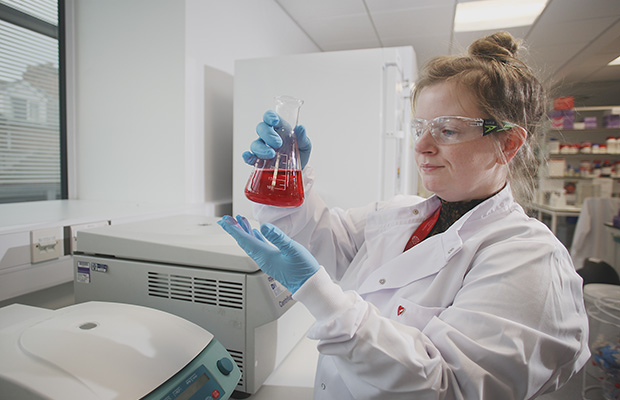06:00
I get up at 6am. I work at Queen’s University Belfast, and it takes me two hours to drive there. My morning involves making sure my three children, aged six, four and one, are ready to leave for day care. It can be difficult, especially if they want to sleep for longer! My husband is brilliant and supports my early start.
09:00
The first thing I do at work is meet the two PhD students that I oversee. I provide them with guidance in their projects, helping to troubleshoot problems, or discussing the results of their experiments.
As they are early in their research careers, it’s important for me to pass on my skills and knowledge. I am also lucky to be supported myself by Professor David Grieve, who has been a huge influence on my career.
Want to get fit and healthy?
Sign up to our fortnightly Heart Matters newsletter to receive healthy recipes, new activity ideas, and expert tips for managing your health. Joining is free and takes two minutes.
I’d like to sign-up
10:00
I spend the rest of my morning working in the lab. I am leading a project that looks at a type of cells called endothelial colony-forming cells (ECFCs). They have a critical role in triggering the development of new blood vessels, a process called angiogenesis. These cells are extremely important for the proper function of the heart and blood vessels.
Reduced formation of new blood vessels is one of the key causes of long-term damage in heart and circulatory conditions
Problems like high blood sugar (for example, if you have diabetes) and low oxygen levels (which can happen if you have a heart condition) can disrupt the way ECFCs work, and as a result, stop the development of new blood vessels. Without new blood vessels to repair damage, less oxygen can reach cells in the body, which can lead to damage to the heart and other tissues. Reduced formation of new blood vessels is one of the key causes of long-term damage in heart and circulatory conditions.
My project aims to find out if changes to DNA are causing the ECFCs to not work as they should. If we learn that this is the case, we could potentially repair the DNA change, to restore the function of the cells.
I will be using a cutting-edge gene-editing technology, called CRISPR. CRISPR can target specific stretches of genetic code and allow researchers to alter DNA sequences and modify gene function. I will be using CRISPR to edit the DNA to switch important genes back on. We need to understand how changes to DNA can affect the way ECFCs behave. It’s a first step towards developing new treatments, by targeting these cells.

13:00
After a quick lunch, my afternoons are spent taking care of admin tasks, which may involve planning my next experiment. We might have a session of our journal club: you choose a scientific paper that you find interesting and relevant, and present it to the group. The final thing I do before I leave is make a list of everything I need to do the next day.
19:00
I get home quite late, after collecting my children from day care on the way, so my husband cooks. He’s very supportive, which is amazing.
My evenings involve helping the children with homework and getting them to bed. I try to sit down for half an hour in the evening before getting ready for the next day, as it’s important to de-stress. I make sure I have time to properly switch off at the weekend, and spend time with my children.
22:00
I try to get to sleep at 10pm as I’m up early the next day. My youngest is not sleeping through the night consistently, but my husband and I share the work.
I love being a mummy and I love my job. It is difficult with young children while I’m at a pivotal point in my career. I am a big supporter of women in STEM (science, technology, engineering and maths) and I think it’s important not to give up on your own career aspirations.
I want to encourage girls to move forward in science because I love what I do, and it can be done while being a mum. For me, having the right support is key, which includes finding good childcare.
I have been supported by BHF during all three maternity leaves and have recently been awarded a prestigious project grant allowing me to take the next step in my career.
I have been funded by BHF since 2015 and in that time I have been able to make numerous contributions to cardiovascular research. This would not have been possible without people donating to BHF, so I’m grateful.
What to read next...
